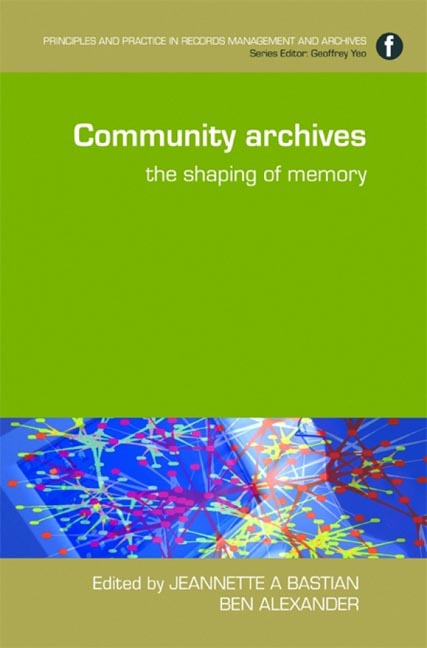Book contents
- Frontmatter
- Contents
- Introduction to the series
- Acknowledgements
- Contributors
- Introduction: Communities and archives – a symbiotic relationship
- Part 1 A community archives model
- Part 2 Communities and non-traditional record keeping
- Part 3 Records loss, destruction and recovery
- Part 4 Online communities: how technology brings communities and their records together
- Part 5 Building a community archive
- Conclusion: The archivist and community
- Bibliography
- Index
- Miscellaneous Endmatter
- Miscellaneous Endmatter
- Miscellaneous Endmatter
Introduction: Communities and archives – a symbiotic relationship
Published online by Cambridge University Press: 08 June 2018
- Frontmatter
- Contents
- Introduction to the series
- Acknowledgements
- Contributors
- Introduction: Communities and archives – a symbiotic relationship
- Part 1 A community archives model
- Part 2 Communities and non-traditional record keeping
- Part 3 Records loss, destruction and recovery
- Part 4 Online communities: how technology brings communities and their records together
- Part 5 Building a community archive
- Conclusion: The archivist and community
- Bibliography
- Index
- Miscellaneous Endmatter
- Miscellaneous Endmatter
- Miscellaneous Endmatter
Summary
SEEKING, BUILDING OR dwelling within the close kinship of community is both an acute desire and a pressing need for many citizens of our global, unbounded and networked 21st century society. These desires and needs often find expression through records. Through their formation, collection, maintenance, diffusion and use, records in all their manifestations are pivotal to constructing a community, consolidating its identity and shaping its memories. Archivists have significant roles to play in this process. Sustaining a community – whether digitally or physically – depends not only on a practical and theoretical understanding of its records but also on the knowledge and ability to preserve and value them. The collection of essays in this volume addresses both the ability of archivists to assist in the community-building process and the responsibilities that archivists have in fostering and furthering all aspects of that development. For while records may fulfil beneficial and legitimating roles in our search for community, they also have other often prescriptive, less benign, but no less critical parts to play. As they demonstrate the many different ways in which communities and records interact with one another, these essays call our attention to both the salutary and the controversial acts of record making and record keeping, illustrating how these activities in themselves may create community.
Every volume presents its own intellectual and professional challenges. This volume is no different. The central challenge is the idea of ‘community’ itself. How do you ask authors to write essays about community when the concept is so ambiguous, so difficult to define? How do you construct a collected volume around ideas that are generally ‘understood’ but not well articulated, that essentially are agreed upon to be fundamentally subjective? While the subjectivity of ‘community’ initially lay at the heart of the editors’ concerns it also proved to be the glue, binding all definitions together and resulting in rewarding analyses as well as inspired and unexpected insights. The authors in this volume, an eclectic group of archivists, librarians and lawyers, approach questions of community from a range of national, cultural and individual perspectives that highlight both the versatility of ‘community’ and its close connection to memory and identity.
The 14 essays in this book make immediately clear that there is no one definition of ‘community’ or even of ‘archives’ and that both of these concepts assume widely disparate meanings in different contexts.
- Type
- Chapter
- Information
- Community ArchivesThe shaping of memory, pp. xxi - xxivPublisher: FacetPrint publication year: 2009
- 2
- Cited by



